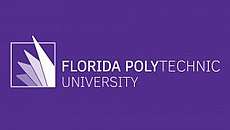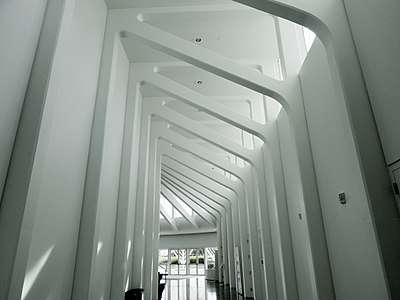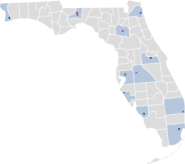Florida Polytechnic University
Florida Polytechnic University (Florida Poly) is a public university in Lakeland, Florida. Created as an independent university in 2012, it is the newest of the 12 institutions in the State University System of Florida. It is the state's only public polytechnic university, and focuses solely on STEM education.[4]
 Logo of Florida Polytechnic University | |
Other name | Florida Poly |
|---|---|
Former names | USF Polytech |
| Type | Public, state university, Semester |
| Established | April 20, 2012[1] |
| President | Randy Avent |
| Provost | Terry Parker |
Academic staff | 97[2] |
Administrative staff | 171[2] |
| Students | 1,236 (Spring 2017)[3] |
| Location | , , United States |
| Campus | Suburban |
| Colors | Royal Purple |
| Affiliations | State University System of Florida |
| Mascot | Phoenix |
| Website | https://floridapoly.edu |
The institution originated as a branch campus of the University of South Florida, which opened in 1988. The State of Florida authorized a new campus in 2008, and renamed the school University of South Florida Polytechnic. In 2012, the Florida Legislature initiated plans to dissolve the USF branch campus and reform the Lakeland institution into an independent school. Florida Poly opened for classes on August 25, 2014 with an inaugural class of 554 students.[5]
Florida Poly resides on a 170-acre[6] campus. The university's Innovation, Science and Technology (IST) Building, designed by architect Santiago Calatrava, is home to a 3-D printing lab, cyber gaming and media lab, cyber security lab, robotics lab, and a big data lab.[7] In addition, Florida Poly is the first university whose campus library is completely digital.[8]
History
.jpg)
The University of South Florida opened a satellite campus in Lakeland – University of South Florida Lakeland – in 1988.[9] The branch shared its grounds with the Lakeland campus of Polk Community College (now Polk State College). By the 2000s it had grown to enroll around 4,000 students, and the local business owners secured state funding for a separate campus in 2008. The same year, USF's trustees renamed the campus University of South Florida Polytechnic, reflecting a new focus on STEM education.[9][10] A site near Interstate 4 was chosen for the new campus. In 2009 Spanish architect Santiago Calatrava was selected to design the campus' first building.[10]
Meanwhile, the institution's backers, most prominently Florida State Senator J. D. Alexander, initiated a campaign to break USF Polytechnic away from USF and form an independent university, Florida Polytechnic University. In 2011 Alexander proposed a 2012-13 state budget that provided $33 million for the move.[11][12] Like the acquisition of the new campus, the proposed split was controversial in some quarters, as it came during a tight budget year and was unpopular with USF students and faculty.[13] In response to Alexander's proposal, the Florida Board of Governors approved a multi-year plan to allow Florida Polytechnic to gain independence gradually once it met certain criteria, including accreditation, the construction of residence halls, and the development of a STEM curriculum.[14] Displeased with the Board's compromise, Alexander introduced a new budget for the state universities that included immediate independence from USF Polytechnic, effectively bypassing the Board of Governors.[15]
On April 20, 2012, Governor Rick Scott signed into law Alexander's budget for the State University System, including the provision that created Florida Polytechnic University as an independent institution, and closed down USF Polytechnic. The law took effect on July 1, 2012.[16][17] In a letter that accompanied the signed legislation (SB 1994[18]) creating Florida Poly, Scott noted that Florida Poly, with its strong focus on STEM programs, will be a key component of the State University System of Florida meeting the goals outlined in its 2012-2015 Strategic Plan. The strategic plan requires the State University System to increase STEM degree production from 9,605 to 22,500 per year by 2025.[19]
The university submitted its initial application for regional accreditation in December 2014.[20] In March 2016, the Florida Poly administration announced that the university would not meet its original accreditation deadline of December 31, 2016. A budget bill sent to the office of Gov. Rick Scott would extend the school's accreditation deadline until December 2017.[19][21] The university finally received accreditation from the Southern Association of Colleges and Schools Commission on Colleges in June 2017.[22][23]
The University had its inaugural commencement ceremony on Jan 3, 2017. Fourteen students graduated with the Master of Science and four students were awarded the Bachelor of Science.[24] The commencement speaker was JD Alexander, the former State Senator known for his advocacy of a STEM university in Lakeland. The campus was thus named after him.[25]
Academics
The university offers nine baccalaureate programs, two master's programs and 31 areas of concentration.[26] Curricula and classroom facilities are designed to facilitate hands-on, applied learning, and degree programs are focused on preparing students for STEM-related careers.[27] Four Florida Poly bachelor's degrees received ABET accreditation on August 28, 2019. The degree programs are computer engineering, computer science, electrical engineering, and mechanical engineering.
Demographics
The inaugural class of students at Florida Poly had an average incoming GPA of 3.9 and test scores of 1350 on the SAT and 25 on the ACT. The average weighted high school GPA was 4.0, with average SAT and ACT scores for admitted freshman in fall 2017 at 1280 (SAT) and 28 (ACT).[28]
Industry partnerships
Florida Poly collaborates with more than 100 high-tech corporate, government and non-government organizations that provide guidance on curriculum development, assist with research and offer internship opportunities that stress real-world experience.[29] Industry partners include Microsoft, Lockheed Martin, Mosaic, Cisco and Harris Corporation.[30] In Sept 2016, the University announced a long-term partnership with the Florida Department of Transportation (FDOT). The FDOT will build a 400-acre technology test facility, which will include a 2.25-mile test track.[31]
Research
The Florida Industrial and Phosphate Research (FIPR) Institute is a Florida Poly research institution. The FIPR institute supports phosphate-related studies to improve the environment, protect public health and increase mining and processing efficiency. FIPR Institute's staff biologists, engineers and chemists also conduct in-house research, and the institute supports some non-phosphate topics such as energy and the mining and processing of other minerals.[32]
Florida Poly's Advanced Mobility Institute (AMI) is a university-affiliated technology research center focused on the development and testing of autonomous vehicle (AV) related technology. AMI is not only unique to the state, but also one of the largest university centers specialized on the narrow area of testing and verification of AV technology in the country.
Campus
Florida Poly's 170-acre campus includes the Innovation, Science and Technology (IST) Building, two residence halls, Student Development Center, Wellness Center, and Admissions Center. The University Trail, which connects the University to the Lakeland campus of Polk State College is one of many biking trails connected to the campus.
Innovation, Science, and Technology (IST) Building

The 162,000-square-foot Innovation, Science, and Technology (IST) Building is the University's main facility. It houses 26 classrooms, faculty and administrative offices, 11,000-square-foot Saddle Creek Logistics Commons, seven innovation labs–including a 3D printing lab, cybersecurity lab, and health informatics lab–where students are able to get hands-on experience with the latest technology. The building is also home to the school's digital library. Designed by Spanish architect Santiago Calatrava, the building includes 94 robotic louvers on the roof that move to accommodate changing sunlight patterns.[33][34]
Applied Research Center
The Applied Research Center (ARC) is under construction with an anticipated opening in spring 2021. The new 85,000 square foot Applied Research Center (ARC) will house research and teaching laboratories, student design spaces, conference rooms, and faculty offices. The building will also provide study areas for graduate students and a small amount of administrative space. A dedicated section of the center will assist with commercialization of innovation and applied research and send new inventions into the marketplace.
Digital Library
Florida Poly's IST Building includes a bookless library where students can access more than 135,000 digital titles on their choice of reader, tablet or laptop.[35] Students still have access to librarians and a reference desk to receive tutoring, resources and training to manage digital materials.[36] Hard copy books can be requested on loan from libraries at Florida's 11 other public universities.
Residence Halls
Florida Polytechnic University has two residence halls, starting with Residence Hall I, with Residence Hall II being built 2015.[37] Residence Hall I consists of three- and four-bedroom suites, while Residence Hall II is mostly two-bedroom "semi-suites".[38] The buildings themselves are owned by an outside companies, as of October 2019 the school's division of student life will manage the dorms
FLPolyCon
Since April 2015,[39][40] Florida Polytechnic University has hosted an annual convention called FLPolyCon. According to the website for the 2018 FLPolyCon, "FLPolyCon is a diverse, all-inclusive geek culture celebration hosted by the students at Florida Polytechnic University."[41] Historically, the convention has catered to the self-professed "geek" culture by including aspects of video games and comics, often of the science fiction genre.[40] More recently, FLPolyCon has been adding elements of anime and cosplay.[42]
References
- "Florida Polytechnic University - SUSF". State University System of Florida. Archived from the original on August 8, 2014. Retrieved June 7, 2014.
- "Florida Polytechnic University Fact Sheet". floridapolytechnic.org. Retrieved 2017-09-16.
- "UNIVERSITY FACT SHEET". floridapoly.edu. Retrieved 2017-09-16.
- "Florida Polytechnic University". i4 Business. Retrieved 28 August 2014.
- Toothman, Mary. "Students Settle Into College Life as Classes Begin at Florida Polytechnic University". The Ledger. Retrieved 25 August 2014.
- Madsen, Deane. "Santiago Calatrava's Florida Polytechnic University Opens Tomorrow". Architect, the Magazine of The American Institute of Architects. Retrieved 15 August 2014.
- "Innovation Labs - Florida Polytechnic University". Florida Polytechnic University. Retrieved 2018-03-02.
- Scott, Simon. "Florida Polytechnic Library Goes Book-Free". NPR. Retrieved 6 September 2014.
- Jerome R. Stockfish (August 3, 2014). "Florida Poly rises from pasture, ready for students". TBO.com. Retrieved July 5, 2016.
- Lawrence Biemiller (June 16, 2009). "Calatrava Will Design First Building for U. of South Florida Polytechnic's New Campus". The Chronicle of Higher Education. Retrieved September 27, 2012.
- Pransky, Noah. "USF Budget Cuts". 10 News fighting to #SaveUSF. 10 News Tampa. Archived from the original on 9 February 2013. Retrieved 16 February 2012.
- Sanders, Katie. "PolitiFact Florida: Understanding the USF budget battle". Tampa Bay Tribune. Retrieved 16 February 2012.
- "JD Alexander is the face of what's wrong with Florida" Tampa Bay Times, March 4, 2012
- "USF-Poly gets conditional permission to break from USF, but won't happen immediately". WTSP. 2011-11-10. Retrieved 2012-07-01.
- "JD Alexander is the face of what's wrong with Florida". Tampa Bay Times. 2012-03-04. Retrieved 2012-07-01.
- "Scott Signs Bill to Establish Florida Poly as State's 12th University". The Ledger. 2012-04-20. Retrieved 2012-07-01.
- "Scott signs law creating independent Florida Polytechnic in Polk Co". Bay News 9. 2012-04-20. Retrieved 2012-07-01.
- "SB 1994: Postsecondary Education". The Florida Senate. Retrieved 22 April 2012.
- "Letter by Governor Rick Scott to Ken Detzner, Secretary of State". The Florida Office of the Governor. Retrieved 20 April 2012.
- "Florida Polytechnic University: Frequently Asked Questions". Florida Polytechnic University. Archived from the original on 23 May 2016. Retrieved 4 March 2015.
- Larrabee, Brandon (18 March 2016). "Florida Poly accreditation delayed". Tampa Bay Business Journal.
- "Florida Polytechnic University now accredited". The Ledger. June 16, 2017. Retrieved 17 June 2017.
- McNeill, Claire (June 16, 2017). "Long-awaited accreditation for Florida Poly marks school as 'serious and legitimate'". Tampa Bay Times. Retrieved 17 June 2017.
- "Florida Polytechnic celebrates an early milestone as first grads turn their tassels". TBO.com. 2017-01-04. Retrieved 2017-01-30.
- "Florida Polytechnic names campus for fighting founder JD Alexander". TBO.com. 2016-04-20. Retrieved 2018-03-02.
- Mitchell, Tia. "Florida Polytechnic survives controversy to enroll its first STEM students". Miami Herald. Retrieved 24 August 2014.
- Sarmah, Satta. "Should Universities Be Built in Silicon Valley's Image?". Fast Company. Retrieved 27 June 2014.
- "Did U Know?". Florida Polytechnic University. Retrieved 29 July 2020.
- "Florida Poly's 1st President: Front and Center". Orlando Sentinel. Retrieved 15 December 2014.
- "Industry Partners". Florida Polytechnic University. Archived from the original on 22 March 2015. Retrieved 4 March 2015.
- "FDOT Announces Partnership with Florida Poly to Develop SunTrax". Florida Polytechnic University. Retrieved 2017-01-30.
- "Florida Industrial and Phosphate Research Institute". Florida Polytechnic University. Archived from the original on 21 February 2015. Retrieved 4 March 2015.
- Chino, Mike. "Santiago Calatrava's Spectacular New Building is a Living, Moving Creature From Out of This World". Inhabitat. Retrieved 12 August 2014.
- "What's That Big White Dome on I-4?". Orlando Sentinel. Retrieved 30 January 2015.
- Kellogg, Carolyn. "Florida Polytechnic University opens with a bookless library". LA Times. Retrieved 20 August 2014.
- Stein, Letitia. "Library without books debuts at Florida's newest college". Reuters. Retrieved 25 August 2014.
- "Florida Poly gets go-ahead to build second residence hall". bizjournals.com. Retrieved 2018-03-02.
- "On-Campus Dining & Residence Halls - Florida Poly". Florida Polytechnic University. Retrieved 2018-03-02.
- "PolyCon". facebook.com. Retrieved 2018-03-02.
- Ledger, Paul Catala The. "Polytechnic University hosts second sci-fi, comic convention". The Ledger. Retrieved 2018-03-02.
- "FLPolyCon| Home". flpolycon.org. Retrieved 2018-03-02.
- "FLPolyCon | Guests". flpolycon.org. Retrieved 2018-03-02.

